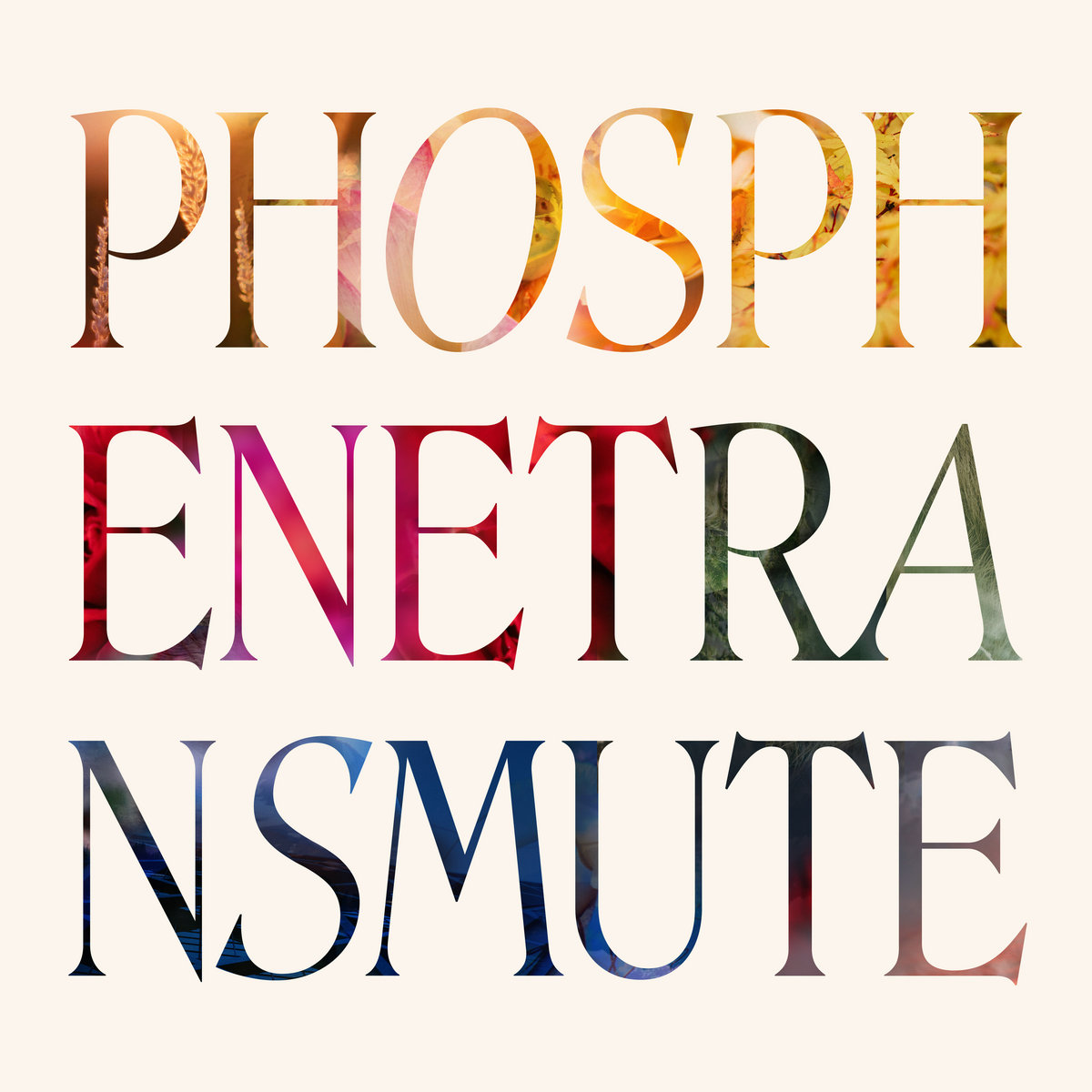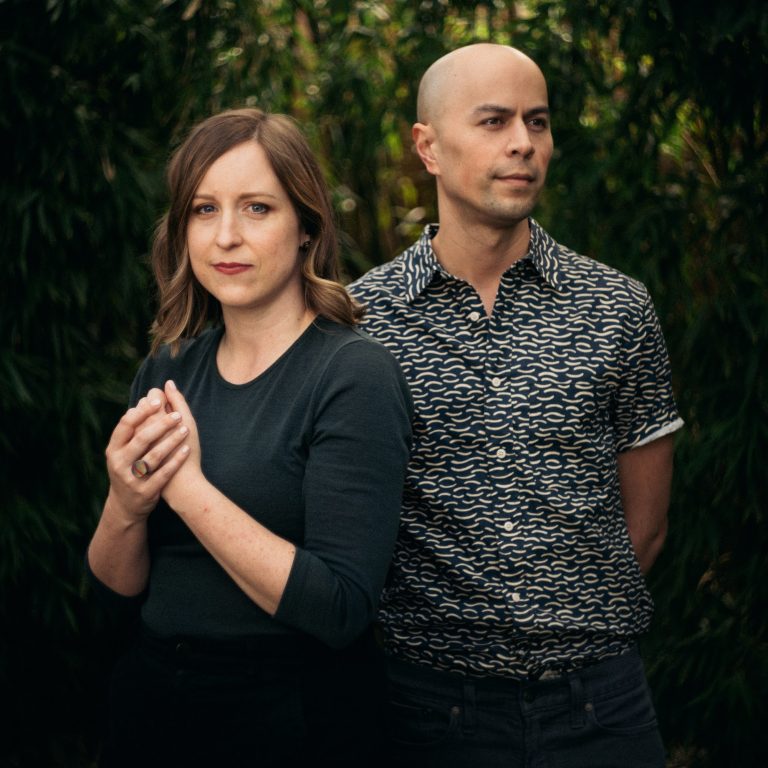While it’s not quite the distance from Point Arena, California to West Quoddy, Maine, I caught up with Phosphene across the internet fibers all the way from my home in Miami and theirs in Portland, OR to hear, track by track, about their third full length album, Transmute, which has just been released.
Phosphene is the duo of Rachel Frankel and Matt Hemmerich. To meet them is to witness something so gentle and polite it is impossible not to get lost in their harmony. They met in San Francisco in 2008, but it took a couple of years to recognize their feelings for each other. Matt played drums; Rachel was a songwriter. Playing in a band together was scary: chemistry in a band is a unicorn of sorts. It is a two-way trust.
They found their horned horse and Phosphene first started in 2013. The band has expanded and contracted over the last decade, but the core duo is all they needed to deliver their finest work yet. Take a look at their guide to Transmute, as told to me, below.

01. “Umbra”
Matt: This song, thematically speaking, is the heaviest one on the album. It’s also six-and-a-half minutes long and has three acts, which took a while to string together. “Umbra” was probably the biggest lift of the album because we so badly wanted to reach this song’s potential. With that said, this one took a lot of iterating.
During the time we wrote “Umbra”, Rachel and I had seen this intense five-part docuseries called Turning Point. It focused on the War on Terror, its origins and lasting impact. Watching that allowed us to re-examine that time and its indelible mark. Lyrically, I wanted to focus on this topic while avoiding any reductive politicking à la American Idiot. I didn’t want to be didactic and preachy or litter the lyrics with sloganeering. Instead, I wanted to explore three different stories. The first verse is from the point of view of someone inside the World Trade Center when the attack happened. The second verse pivots to a soldier in Afghanistan, while the middle 8 is from a widow’s perspective. We sought to spotlight humanity more than anything else in the lyrics.
02. “Black Sheep”
Matt: “Black Sheep” was one of the first tracks we wrote after we moved up to Portland in 2018. It was a fascinating evolution as the tune was folk-tinged when Rachel wrote it on acoustic guitar. We played around with some treatments for a while, and ultimately leaned into this post-punk, Joy Division direction for the final production. I was so drawn to Rachel’s haunting melodies that I chose to open up about my struggles with depression in the lyrics. I was also inspired by the book Dog Years by Kaye Blegvad, which uses pet ownership as a metaphor for what life is like managing depression. It was a beautiful way to depict and demystify that stigma. This song was also special because we got to direct and edit our first real music video to pair with it.
03. “Levitation”
Rachel: This is one of the moments on the album where we come up for air a bit. “Levitation” actually stems from an older song off our first album, called “Go to Sleep,” which was the first Phosphene song Matt wrote from start to finish on guitar. We had wanted to do it justice and reimagine it for a long time. The first version had half as many melodies and lyrics and was way more instrumental. Thematically, “Levitation” is more about reclamation, shunning taboos, and embracing pleasure. When we play this track live, it tends to be our rowdiest. It’s nice to have this moment early on in the album where you’re buoyed up for a second after going through some heavier tracks.
04. “Jigsaw”
Rachel: We first started writing this song during peak lockdown around April 2020. None of us really knew what was in store, or for how long. We were all just sitting in that anxiety and loss of connection and worrying about our loved ones. Matt pulled a lot of the lyrical inspiration from news during that time, and stories that were coming out of New York.
Matt: I picked up Rachel’s acoustic guitar and managed to write the verse and chorus during the same session before landing on the bridge later that week. I didn’t want to reference COVID directly; just the emotions surrounding it. The perspective is from someone journaling alone, thinking of a loved one’s safety. It makes a reference to Hart Island, a mass graveyard in NYC, where many Covid victims were laid to rest. We never completely embraced writing a ballad before, so we wanted to handle “Jigsaw” with care and avoid it becoming saccharine. We tapped our friend, Ryan Huff, who is an amazing composer and sound designer, for a digital string arrangement to accompany “Jigsaw”, which you can hear layered throughout the song.
05. “Wisp”
Rachel: It is a reference to someone from my past. This was someone I never actually dated, but was kind of entangled with for some time. “Wisp” was this reflection of what I saw them do to other partners up close, and even from afar years later. It is that feeling, especially looking back several years removed, thinking: ‘Wow, you dodged a bullet.’ My roots as a musician are in indie folk music, so this tune felt like an opportunity to delve more into that side of our sonic palette. It was fun to explore that, especially towards the end where I layered in some Western-tinged guitar leads.
06. “Transmute”
Matt: We had the main parts of this song written a decade ago, but it idled for some time when Rachel couldn’t land on a vocal melody. I lobbied year after year for us to revisit it, and it took the pandemic for that to happen. The time away from “Transmute” was a blessing, as we weren’t at a level to properly execute a track like this yet. Lyrically, it is about performative allyship. Similar to “Umbra”, I didn’t want to lecture or ramble on here. Instead, I channeled a darker humor on that kind of allyship we all witnessed in 2020. After the rise of Black Lives Matter following George Floyd’s death, we saw all of these largely empty gestures from corporations and politicians that were trying to seize the moment.
07. “Everyone is Gone”
Rachel: Instrumentally, I was inspired by Elliott Smith, who has been a huge songwriting influence of mine for nearly two decades. The verse chord progression was the first thing to emerge, and the jangly rhythm of it set the tone for the rest of the song. “Everyone is Gone” references the unfortunate phenomenon of disinformation and appropriation that we’ve all seen over the last several years. It was cathartic to capture our frustration with these things in the speak-sing approach of the vocals and in the guitar solo. We tried some different approaches to the middle 8 section and ultimately landed on this groovy, hypnotic combo of guitar, synth and drums that take you on a journey before we return to the last verse.
08. “Wandering”
Rachel: This song dates back to early 2018. We were still in the Bay Area, but had made the decision to move to Portland later that year. The main song structure and vocal melody stem from one of our last jam sessions with our great friend and former bassist, Kevin Kaw. Our friend Ryan Huff also helped us with some beautiful string arrangements on “Wandering”. They add a level of grandiosity to the track—especially in the outro—and were inspired by the “Wall of Sound” aesthetic. While the song may sound peppy and sunny, it’s actually a rumination on the afterlife. The story begins with this narrator waking up in a limbo space between life and death, and they meet someone and immediately become infatuated. Upon realizing that this new love interest won’t be joining them in the afterlife, there’s a desperation in the chorus about how they’ll do anything to keep this person around to avert their own loneliness.
Phosphene’s new album Transmute is out now.
You can follow them on Facebook, Twitter, Instagram and on their official site.

